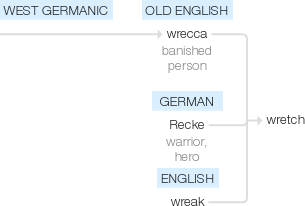Wretch
Old English wrecca (also in the sense ‘banished person’), of West Germanic origin; related to German Recke ‘warrior, hero’, also to the verb wreak.
wiktionary
From Middle English wrecche, from Old English wreċċa(“exile, outcast”), from Proto-Germanic *wrakjô(“exile, fugitive, warrior”), from Proto-Indo-European *wreg-(“to track, follow”). Doublet of garçon.
wretch (third-person singular simple present wretches, present participle wretching, simple past and past participle wretched)
etymonline
wretch (n.)
Old English wrecca "wretch, stranger, exile," from Proto-Germanic *wrakjon "pursuer; one pursued" (source also of Old Saxon wrekkio, Old High German reckeo "a banished person, exile," German recke "renowned warrior, hero"), related to Old English wreccan "to drive out, punish" (see wreak). "The contrast in the development of the meaning in Eng. and German is remarkable" [OED]. Sense of "vile, despicable person" developed in Old English, reflecting the sorry state of the outcast, as presented in Anglo-Saxon verse (such as "The Wanderer"). Compare German Elend "misery," from Old High German elilenti "sojourn in a foreign land, exile."
